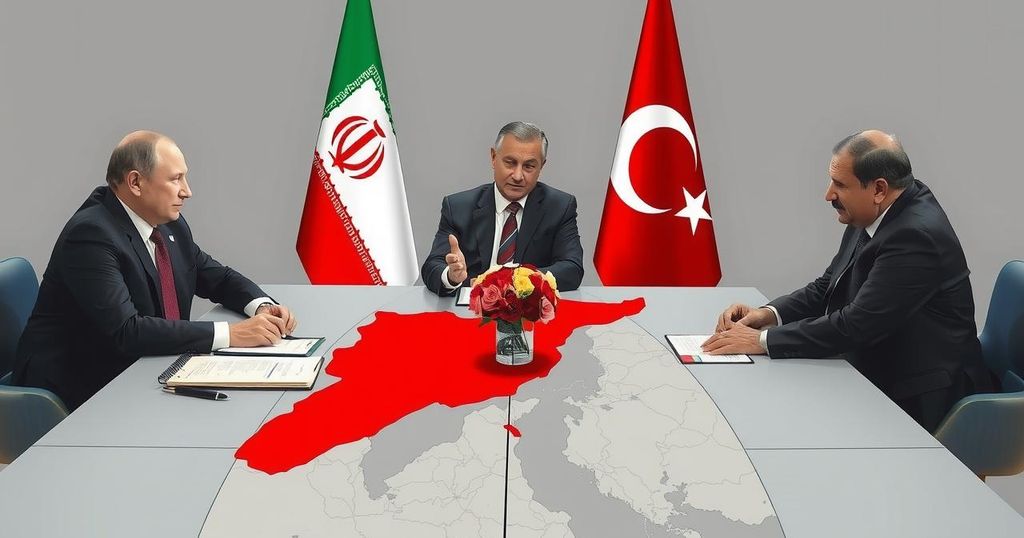Turkey, Russia, and Iran to Discuss Syrian Conflict Amidst New Developments

Turkey, Russia, and Iran are set to meet this weekend in Qatar to address the ramifications of a recent offensive by Islamist rebels in Syria, which has altered the conflict’s dynamics. The talks, organized on the sidelines of the Doha Forum, aim to revive the Astana process and seek a resolution to the civil war amid concerns about territorial integrity, Kurdish forces, and the resurgence of ISIS.
This weekend, Turkey, Russia, and Iran are set to convene in Qatar to address the recent developments in the Syrian civil conflict, particularly following an unexpected offensive by Islamist rebels that has significantly changed the dynamics on the battlefield. The discussions will occur in conjunction with the Doha Forum, which gathers global leaders and officials to engage in critical dialogues on various issues.
Turkey’s Foreign Minister, Hakan Fidan, will lead the negotiations with his Russian and Iranian counterparts. This trilateral dialogue is part of the Astana process initiated in 2017, aimed at reaching a peaceful resolution to the ongoing war. Despite a ceasefire brokered in 2020 that had largely stabilized the situation, recent advances by Hayat Tahrir al-Sham (HTS) have posed new challenges, including the capture of Aleppo and rapid incursions towards Hama and Homs, cities that have largely remained under government control since the war’s inception in 2011.
The Kremlin revealed that Russian President Vladimir Putin emphasized the urgency of quelling military actions against the Assad regime during a recent communication with Turkish President Recep Tayyip Erdogan. Erdogan reaffirmed Turkey’s commitment to Syria’s unity while stressing the need for the Assad administration to pursue political resolutions. Notably, Turkey has been a vocal opponent of Kurdish autonomy in northern Syria, complicating its relationship with the Syrian Democratic Forces (SDF), which are backed by the United States.
The shifting tide on the battlefield has ignited clashes between Turkey-backed factions and U.S.-aligned units amidst the escalating HTS offensive. While Russia’s military involvement has been crucial for supporting Assad, its attention is currently diverted by the ongoing war in Ukraine. Concurrently, Iran faces pressures from Israel’s operations against its military relationships within the region, further complicating the sustainability of support for Assad.
Experts express mixed opinions regarding the implications of HTS advancements. Some, such as former U.S. Ambassador to Syria Robert Ford, argue that this could compel Assad’s backers to consider compromises. However, others assert that both Russia and Iran remain committed to maintaining their strategic influences in Syria, emphasizing the significance of such a foothold for Russia and the need for Iran to secure its proposed Shiite Crescent across the region.
Moreover, the potential resurgence of ISIS poses a grave concern amidst these conflicts, particularly as the U.S. maintains approximately 900 troops in Syria to support the SDF’s fight against ISIS remnants. U.S. officials have indicated that existing chaos in Syria is primarily a result of Assad’s obstinacy in fostering a political dialogue, a position that frustrates both Turkey and the U.S. Given the instability, the U.S. seeks to prevent a refugee surge that could exacerbate the humanitarian crisis in the region.
In conclusion, the upcoming talks in Qatar aim to address the rapidly evolving conflict dynamics in Syria, where the implications of HTS territorial gains present both opportunities and challenges for the involved nations. The effective negotiation outcomes may significantly impact the trajectory of the Syrian civil war and the broader geopolitical landscape in the region.
The Syrian civil conflict, which began in 2011, has generated a complex geopolitical environment with numerous local and international stakeholders. Turkey, Russia, and Iran have emerged as central players, each with distinct interests in the country’s future. The Astana process, initiated in 2017, was formed to facilitate dialogue and find a political resolution to the war. However, recent escalations by Islamist factions such as HTS disrupt previous understandings and outline new challenges to stability in the region, highlighting the delicate balance of power and the ongoing influence of external actors like the United States.
This forthcoming meeting among Turkey, Russia, and Iran represents a critical juncture for addressing the volatile situation in Syria spurred by recent advances by Islamist rebels. The complexities arising from these developments demand concerted efforts among the involved nations to navigate potential diplomatic resolutions while grappling with various strategic interests. The outcome of these discussions will undoubtedly play a significant role in shaping the future landscape of the ongoing Syrian conflict and regional security.
Original Source: www.voanews.com






